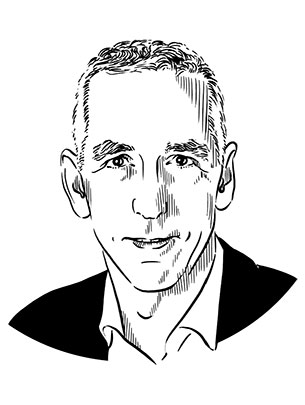Age-related unemployment.
Text: Christoph Dieffenbacher
Older workers are at a disadvantage, especially when faced with the threat of redundancies or when applying for a new job. According to Kurt Pärli, a Basel-based professor of law, Switzerland performs worse than other countries when it comes to discrimination against older people.
Hiring: border guard aged between 20 and 35” or “Coach/truck driver (m/f) between the ages of 20 and 50”: Newspapers and job boards in Switzerland feature advertisements like these on a daily basis. By specifying a target age, the offers discriminate directly against older job seekers. Indeed, studies show that three out of four workers face an age- related disadvantage when changing jobs. In Europe, almost two thirds of the population fear they will fall victim to this kind of discrimination at some point in their life.
Unequal treatment as “standard”
Fears of this kind are well-founded: After losing a job, older workers typically have little chance of regaining a foothold in the world of work – despite their best efforts. Although Switzerland has a high proportion of over-55s in gainful employment, those who find their employment terminated at this age are faced with a dire situation.
Age discrimination is “standard” here, so to speak, says Kurt Pärli, Professor of Social Private Law at the University of Ba- sel. The situation is different abroad: In the European Union, for example, age is embodied as one of several grounds for discrimination in directives, which member states are required to implement. Although discrimination is prohibited by the Swiss constitution, there is a lack of appropriate implementing legislation.
In practice, the Federal Supreme Court nevertheless recognizes a heightened duty of care on the part of employers in special cases, such as when employees have reached a certain age and achieved a certain number of years of service. According to Pärli, however, this is “more of a moral categorization” and actually no longer reflects the realities of today’s labor market.
Younger people also disadvantaged
Younger people can also be at an indirect disadvantage when it comes to recruitment – for example, if job advertisements and pay grades place particular value on professional experience or years of service. In that case, older people actually have an advantage over younger candidates. Furthermore, age is not the only basis for workplace discrimination, with other grounds including characteristics such as gender, nationality or skin color.
Pärli says that the general preference for younger people in the labor market relies heavily on preconceptions: “Generalizing assumptions about mental and physical capabilities diminishing in old age are not borne out by the findings of recent aging research.” Aging processes differ from one individual to another – and, he says, many older people harbor untapped potential to mobilize and develop their own professional skills.
State and private sector are converging
According to the professor of law, there are – broadly speaking – two sectors of the labor market. Recruitment under public law in Switzerland is typically the work of the state and is bound by the fundamental rights enshrined in the Federal Constitution – and particularly by the prohibition on discrimination, which also specifically mentions age. In practice, however, it is possible to define legal age limits for certain occupations, such as border officials or police officers.
By contrast, employment relationships under private law, which are customary in the private sector, enjoy what is known as freedom of contract. This is considered an extremely important principle here in Switzerland. Although employment contracts under private law do impose a number of obligations on employers, older people are still disproportionately affected by redundancies, for example. Nevertheless, it may transpire that dismissals are only deemed improper if the employer specifically mentions age, as the Federal Supreme Court has ruled in several cases.
Pärli is keen to highlight that, nowadays, there is growing convergence between public and private employment law. On the one hand, the official status of civil servants has been abolished, for example – and, on the other hand, courts have imposed a heightened duty of care on private sector employers.
Redundancies have a particularly profound effect on older people. For them, losing a job is associated with serious consequences such as a reduction of social security benefits in old age. The same is true of mandatory retirement in the event that the affected individuals would have liked to continue working beyond retirement age. In principle, Pärli believes that terminating contracts in this way is permissible under current law.
Legislation needed
Pärli explains that age discrimination is difficult to challenge legally in Switzerland because the country lacks appropriate legislation, and that there have been scarcely any court cases due to ageism in hiring. Swiss workers lack effective legal protection if their application is rejected because of age: “Unlike in other countries, we have no clear legal safeguards against age discrimination in recruitment,” says Pärli.
So, what solution does he suggest? Whatever happens, he believes the goal should be to introduce statutory regulation, which must be designed to be “ageneutral,” as the expert in employment law puts it. In his view, the answer is to move toward stronger protection against dismissal and a prohibition on discrimination during recruitment. A prospective law could incorporate discrimination as a general violation of basic personal rights rather than confining itself to age. Another possibility would be to introduce a right of appeal for associations, as well as effective sanctions for offending employers according to their size – such as penalties amounting to a certain percentage of annual turnover.
Kurt Pärli is Professor of Social Private Law at the University of Basel. As well as anti-discrimination legislation, his research topics include law relating to occupational reintegration, employment and social security, as well as health and data protection.
More articles in the current issue of UNI NOVA.

